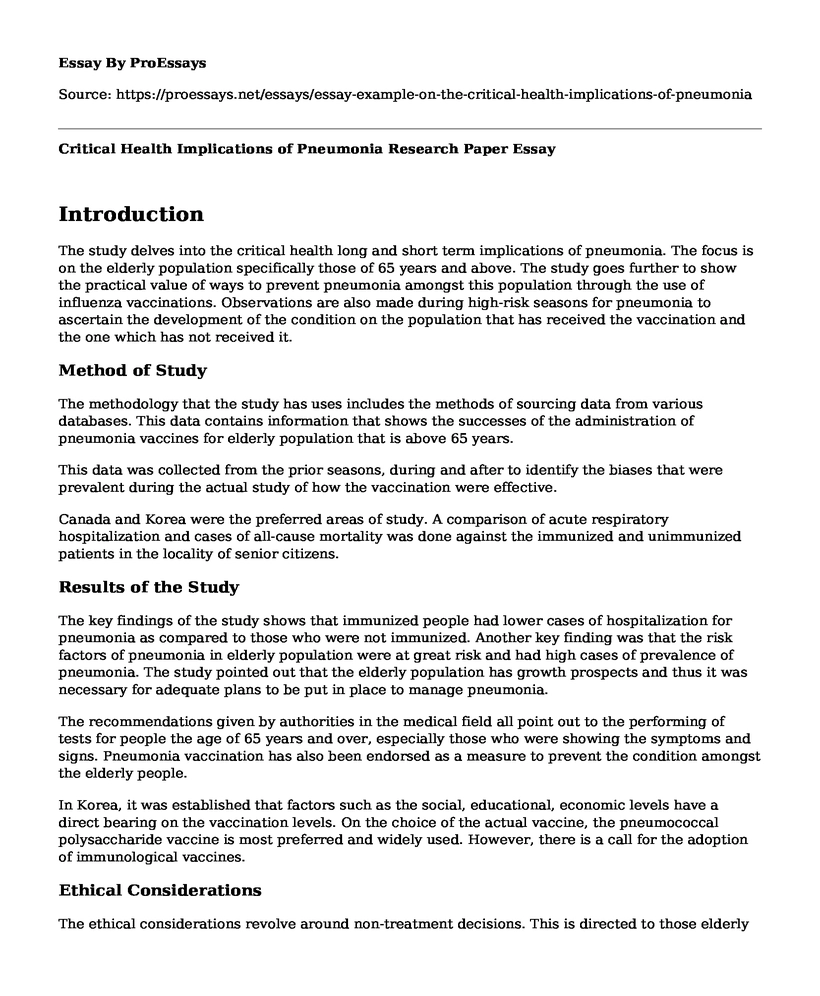Introduction
The study delves into the critical health long and short term implications of pneumonia. The focus is on the elderly population specifically those of 65 years and above. The study goes further to show the practical value of ways to prevent pneumonia amongst this population through the use of influenza vaccinations. Observations are also made during high-risk seasons for pneumonia to ascertain the development of the condition on the population that has received the vaccination and the one which has not received it.
Method of Study
The methodology that the study has uses includes the methods of sourcing data from various databases. This data contains information that shows the successes of the administration of pneumonia vaccines for elderly population that is above 65 years.
This data was collected from the prior seasons, during and after to identify the biases that were prevalent during the actual study of how the vaccination were effective.
Canada and Korea were the preferred areas of study. A comparison of acute respiratory hospitalization and cases of all-cause mortality was done against the immunized and unimmunized patients in the locality of senior citizens.
Results of the Study
The key findings of the study shows that immunized people had lower cases of hospitalization for pneumonia as compared to those who were not immunized. Another key finding was that the risk factors of pneumonia in elderly population were at great risk and had high cases of prevalence of pneumonia. The study pointed out that the elderly population has growth prospects and thus it was necessary for adequate plans to be put in place to manage pneumonia.
The recommendations given by authorities in the medical field all point out to the performing of tests for people the age of 65 years and over, especially those who were showing the symptoms and signs. Pneumonia vaccination has also been endorsed as a measure to prevent the condition amongst the elderly people.
In Korea, it was established that factors such as the social, educational, economic levels have a direct bearing on the vaccination levels. On the choice of the actual vaccine, the pneumococcal polysaccharide vaccine is most preferred and widely used. However, there is a call for the adoption of immunological vaccines.
Ethical Considerations
The ethical considerations revolve around non-treatment decisions. This is directed to those elderly people who have dementia. They normally don't have the ability to evaluate a situation or even communicate their wishes with regard to the vaccinations. Sometimes health practitioners face the dilemma of giving intravenous drugs or fluids to the patients as it may contribute to the burden.
Three key things are considered: The medical aspects, patients autonomy and the patients best interest.
Conclusion
Pneumonia vaccination for seniors can indeed be a good measure to prevent and manage pneumonia among people who are 65 years and over. The use of influenza vaccine is indeed an efficient and effective strategy that has borne fruit in the majority of areas in which it has been administered. The protective efficacy of pneumococcal vaccination against pneumonia in older adults is quintessential.
References
Centers for Disease Control and Prevention. Estimates of deaths associated with seasonal influenza United States, 19762007. MMWR Morb Mortal Wkly Rep. 2010;59(33):10571062.
Beigel JH. Influenza. Crit Care Med. 2008;36(9):26602666.
Thomas CP, Ryan M, Chapman JD, et al. Incidence and cost of pneumonia in Medicare beneficiaries. Chest. Epub March 8, 2012.
Fedson DS, Musher DM. Pneumococcal polysaccharide vaccine. In: Plotkin SA, Orenstein WA, editors. Vaccines. Philadelphia: Saunders; 2003. pp. 529588.
Sankilampi U, Honkanen PO, Bloigu A, Herva E, Leinonen M. Antibody response to pneumococcal capsular polysaccharide vaccine in the elderly. J Infect Dis. 1996;173(2):387393.
Lai CC, Lee LN, Yu CJ, et al. Antibody responses to pneumococcal polysaccharide vaccine in Taiwanese patients with chronic obstructive pulmonary disease. J Formos Med Assoc. 2007;106(3):196203.
Schenkein JG, Park S, Nahm MH. Pneumococcal vaccination in older adults induces antibodies with low opsonic capacity and reduced antibody potency. Vaccine. 2008;26(43):55215526.
Rubins JB, Puri AK, Loch J, et al. Magnitude, duration, quality, and function of pneumococcal vaccine responses in elderly adults. J Infect Dis. 1998;178(2):431440.
Romero-Steiner S, Musher DM, Cetron MS, et al. Reduction in functional antibody activity against Streptococcus pneumoniae in vaccinated elderly individuals highly correlates with decreased IgG antibody avidity. Clin Infect Dis. 1999;29(2):281288.
Cite this page
Critical Health Implications of Pneumonia Research Paper. (2021, Jun 17). Retrieved from https://proessays.net/essays/essay-example-on-the-critical-health-implications-of-pneumonia
If you are the original author of this essay and no longer wish to have it published on the ProEssays website, please click below to request its removal:
- Research Paper Sample: The Effect of Coffee on Student Performance
- Essay Example on Opiates and Opioids: Pain-Relieving Drugs With Similar Effects
- Case Study: Acute Pain and Work: Riley's Struggle in the Hospital
- Unpacking Community Health Education Theory: Promoting Health Equity - Research Paper
- Essay on Inclusive Education: Achieving Social & Academic Success for Children With Disabilities
- Pathophysiology of Lateral Epicondylitis: Occupational and Non-Athletic Causes - Research Paper
- Essential Workers: Key Players in Coronavirus Crisis - Essay Sample







